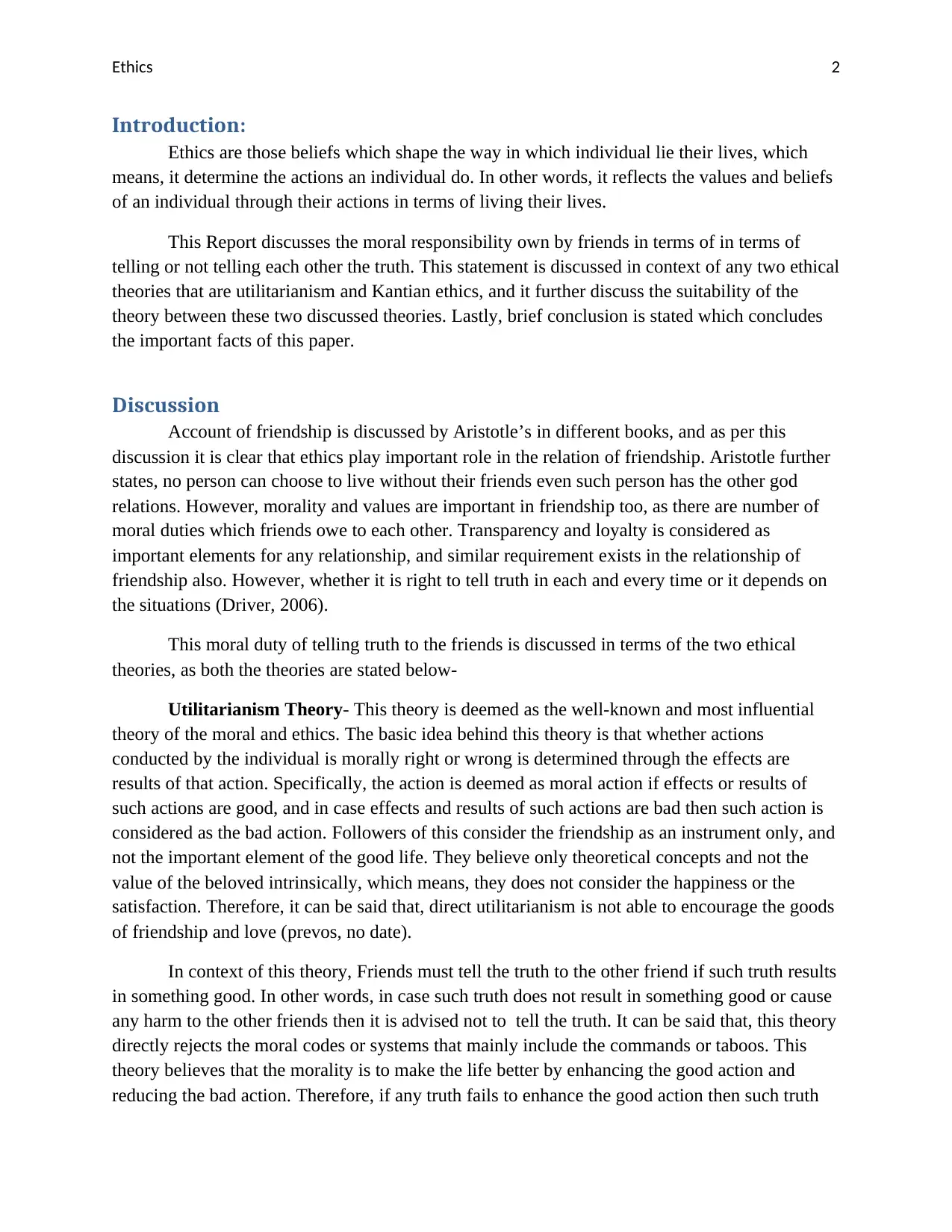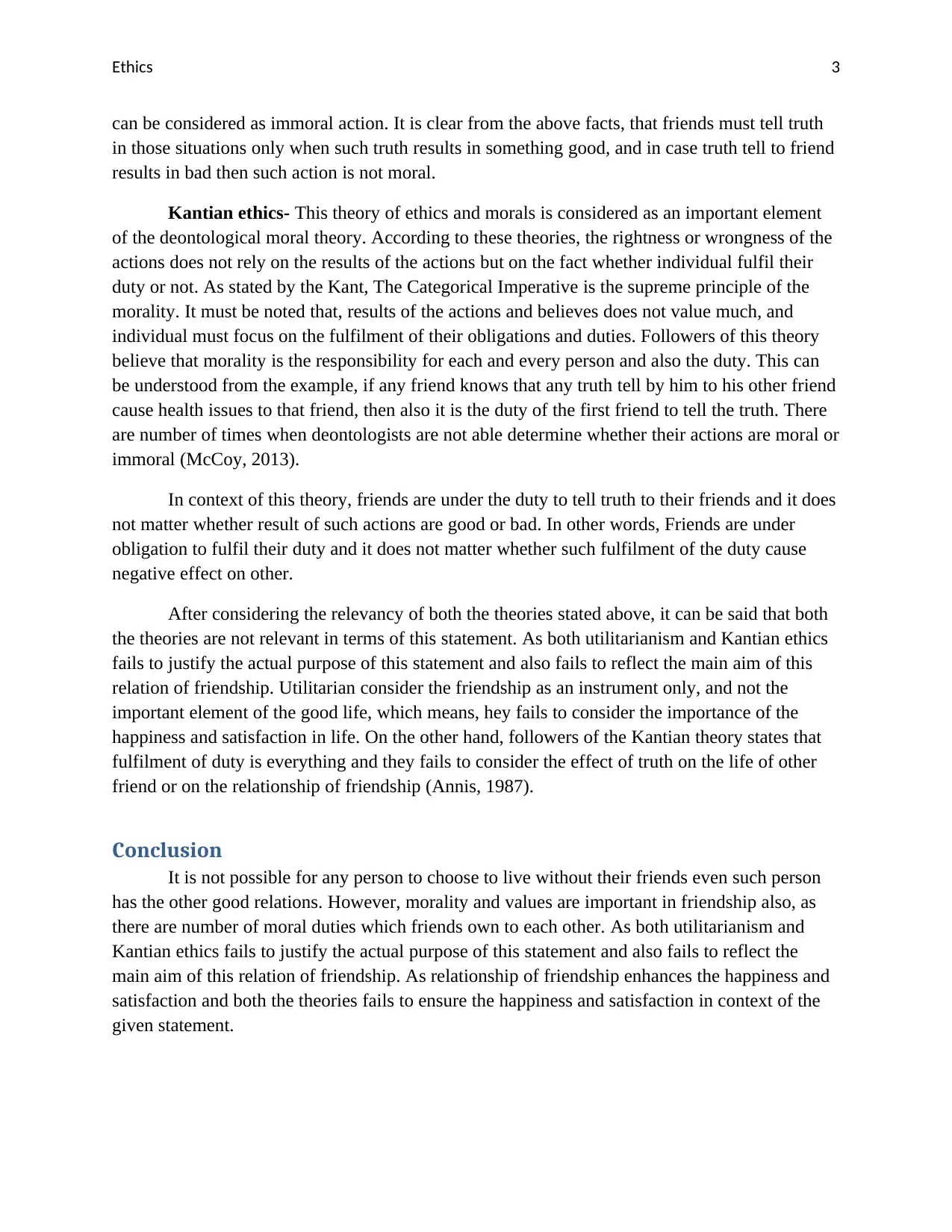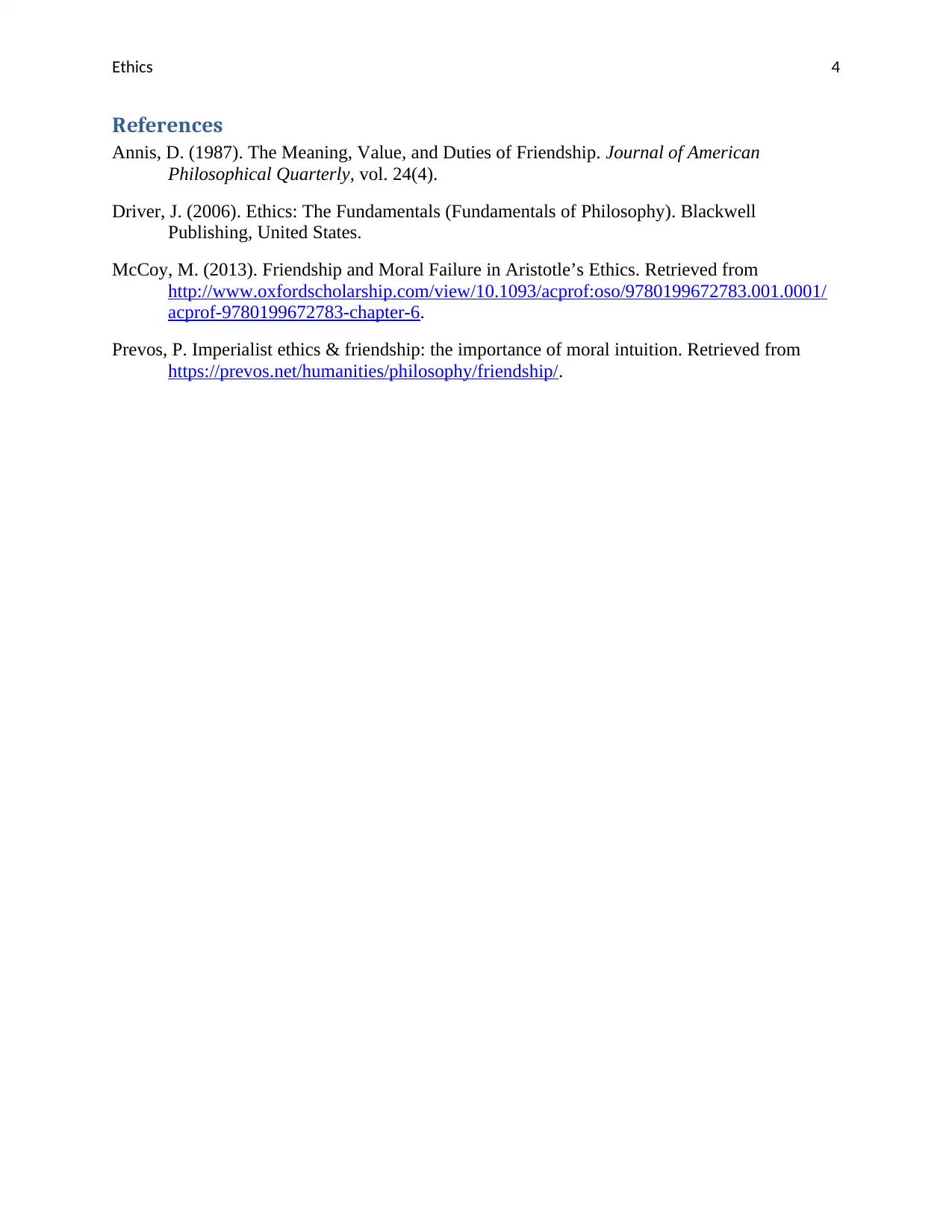Ethics Essay: Utilitarianism, Kantian Ethics, and Friendship
VerifiedAdded on 2023/06/04
|4
|1207
|437
Essay
AI Summary
This essay examines the ethical responsibilities of friends, specifically focusing on the moral duty of truth-telling. The introduction establishes the importance of ethics in shaping individual actions and values within the context of friendship, referencing Aristotle's views. The essay then delves into two prominent ethical theories: utilitarianism and Kantian ethics. Utilitarianism is presented as a theory where the morality of an action is determined by its consequences, with truth-telling being encouraged only when it leads to good outcomes. In contrast, Kantian ethics emphasizes duty and obligation, suggesting that friends have a duty to tell the truth regardless of the consequences. The essay then critiques the applicability of both theories to the context of friendship, arguing that both theories fall short in capturing the essence of friendship, which includes happiness and satisfaction. The conclusion reiterates the importance of morality and values in friendships while acknowledging the limitations of the discussed ethical frameworks.

Ethics 1
Ethics
Ethics
Paraphrase This Document
Need a fresh take? Get an instant paraphrase of this document with our AI Paraphraser

Ethics 2
Introduction:
Ethics are those beliefs which shape the way in which individual lie their lives, which
means, it determine the actions an individual do. In other words, it reflects the values and beliefs
of an individual through their actions in terms of living their lives.
This Report discusses the moral responsibility own by friends in terms of in terms of
telling or not telling each other the truth. This statement is discussed in context of any two ethical
theories that are utilitarianism and Kantian ethics, and it further discuss the suitability of the
theory between these two discussed theories. Lastly, brief conclusion is stated which concludes
the important facts of this paper.
Discussion
Account of friendship is discussed by Aristotle’s in different books, and as per this
discussion it is clear that ethics play important role in the relation of friendship. Aristotle further
states, no person can choose to live without their friends even such person has the other god
relations. However, morality and values are important in friendship too, as there are number of
moral duties which friends owe to each other. Transparency and loyalty is considered as
important elements for any relationship, and similar requirement exists in the relationship of
friendship also. However, whether it is right to tell truth in each and every time or it depends on
the situations (Driver, 2006).
This moral duty of telling truth to the friends is discussed in terms of the two ethical
theories, as both the theories are stated below-
Utilitarianism Theory- This theory is deemed as the well-known and most influential
theory of the moral and ethics. The basic idea behind this theory is that whether actions
conducted by the individual is morally right or wrong is determined through the effects are
results of that action. Specifically, the action is deemed as moral action if effects or results of
such actions are good, and in case effects and results of such actions are bad then such action is
considered as the bad action. Followers of this consider the friendship as an instrument only, and
not the important element of the good life. They believe only theoretical concepts and not the
value of the beloved intrinsically, which means, they does not consider the happiness or the
satisfaction. Therefore, it can be said that, direct utilitarianism is not able to encourage the goods
of friendship and love (prevos, no date).
In context of this theory, Friends must tell the truth to the other friend if such truth results
in something good. In other words, in case such truth does not result in something good or cause
any harm to the other friends then it is advised not to tell the truth. It can be said that, this theory
directly rejects the moral codes or systems that mainly include the commands or taboos. This
theory believes that the morality is to make the life better by enhancing the good action and
reducing the bad action. Therefore, if any truth fails to enhance the good action then such truth
Introduction:
Ethics are those beliefs which shape the way in which individual lie their lives, which
means, it determine the actions an individual do. In other words, it reflects the values and beliefs
of an individual through their actions in terms of living their lives.
This Report discusses the moral responsibility own by friends in terms of in terms of
telling or not telling each other the truth. This statement is discussed in context of any two ethical
theories that are utilitarianism and Kantian ethics, and it further discuss the suitability of the
theory between these two discussed theories. Lastly, brief conclusion is stated which concludes
the important facts of this paper.
Discussion
Account of friendship is discussed by Aristotle’s in different books, and as per this
discussion it is clear that ethics play important role in the relation of friendship. Aristotle further
states, no person can choose to live without their friends even such person has the other god
relations. However, morality and values are important in friendship too, as there are number of
moral duties which friends owe to each other. Transparency and loyalty is considered as
important elements for any relationship, and similar requirement exists in the relationship of
friendship also. However, whether it is right to tell truth in each and every time or it depends on
the situations (Driver, 2006).
This moral duty of telling truth to the friends is discussed in terms of the two ethical
theories, as both the theories are stated below-
Utilitarianism Theory- This theory is deemed as the well-known and most influential
theory of the moral and ethics. The basic idea behind this theory is that whether actions
conducted by the individual is morally right or wrong is determined through the effects are
results of that action. Specifically, the action is deemed as moral action if effects or results of
such actions are good, and in case effects and results of such actions are bad then such action is
considered as the bad action. Followers of this consider the friendship as an instrument only, and
not the important element of the good life. They believe only theoretical concepts and not the
value of the beloved intrinsically, which means, they does not consider the happiness or the
satisfaction. Therefore, it can be said that, direct utilitarianism is not able to encourage the goods
of friendship and love (prevos, no date).
In context of this theory, Friends must tell the truth to the other friend if such truth results
in something good. In other words, in case such truth does not result in something good or cause
any harm to the other friends then it is advised not to tell the truth. It can be said that, this theory
directly rejects the moral codes or systems that mainly include the commands or taboos. This
theory believes that the morality is to make the life better by enhancing the good action and
reducing the bad action. Therefore, if any truth fails to enhance the good action then such truth

Ethics 3
can be considered as immoral action. It is clear from the above facts, that friends must tell truth
in those situations only when such truth results in something good, and in case truth tell to friend
results in bad then such action is not moral.
Kantian ethics- This theory of ethics and morals is considered as an important element
of the deontological moral theory. According to these theories, the rightness or wrongness of the
actions does not rely on the results of the actions but on the fact whether individual fulfil their
duty or not. As stated by the Kant, The Categorical Imperative is the supreme principle of the
morality. It must be noted that, results of the actions and believes does not value much, and
individual must focus on the fulfilment of their obligations and duties. Followers of this theory
believe that morality is the responsibility for each and every person and also the duty. This can
be understood from the example, if any friend knows that any truth tell by him to his other friend
cause health issues to that friend, then also it is the duty of the first friend to tell the truth. There
are number of times when deontologists are not able determine whether their actions are moral or
immoral (McCoy, 2013).
In context of this theory, friends are under the duty to tell truth to their friends and it does
not matter whether result of such actions are good or bad. In other words, Friends are under
obligation to fulfil their duty and it does not matter whether such fulfilment of the duty cause
negative effect on other.
After considering the relevancy of both the theories stated above, it can be said that both
the theories are not relevant in terms of this statement. As both utilitarianism and Kantian ethics
fails to justify the actual purpose of this statement and also fails to reflect the main aim of this
relation of friendship. Utilitarian consider the friendship as an instrument only, and not the
important element of the good life, which means, hey fails to consider the importance of the
happiness and satisfaction in life. On the other hand, followers of the Kantian theory states that
fulfilment of duty is everything and they fails to consider the effect of truth on the life of other
friend or on the relationship of friendship (Annis, 1987).
Conclusion
It is not possible for any person to choose to live without their friends even such person
has the other good relations. However, morality and values are important in friendship also, as
there are number of moral duties which friends own to each other. As both utilitarianism and
Kantian ethics fails to justify the actual purpose of this statement and also fails to reflect the
main aim of this relation of friendship. As relationship of friendship enhances the happiness and
satisfaction and both the theories fails to ensure the happiness and satisfaction in context of the
given statement.
can be considered as immoral action. It is clear from the above facts, that friends must tell truth
in those situations only when such truth results in something good, and in case truth tell to friend
results in bad then such action is not moral.
Kantian ethics- This theory of ethics and morals is considered as an important element
of the deontological moral theory. According to these theories, the rightness or wrongness of the
actions does not rely on the results of the actions but on the fact whether individual fulfil their
duty or not. As stated by the Kant, The Categorical Imperative is the supreme principle of the
morality. It must be noted that, results of the actions and believes does not value much, and
individual must focus on the fulfilment of their obligations and duties. Followers of this theory
believe that morality is the responsibility for each and every person and also the duty. This can
be understood from the example, if any friend knows that any truth tell by him to his other friend
cause health issues to that friend, then also it is the duty of the first friend to tell the truth. There
are number of times when deontologists are not able determine whether their actions are moral or
immoral (McCoy, 2013).
In context of this theory, friends are under the duty to tell truth to their friends and it does
not matter whether result of such actions are good or bad. In other words, Friends are under
obligation to fulfil their duty and it does not matter whether such fulfilment of the duty cause
negative effect on other.
After considering the relevancy of both the theories stated above, it can be said that both
the theories are not relevant in terms of this statement. As both utilitarianism and Kantian ethics
fails to justify the actual purpose of this statement and also fails to reflect the main aim of this
relation of friendship. Utilitarian consider the friendship as an instrument only, and not the
important element of the good life, which means, hey fails to consider the importance of the
happiness and satisfaction in life. On the other hand, followers of the Kantian theory states that
fulfilment of duty is everything and they fails to consider the effect of truth on the life of other
friend or on the relationship of friendship (Annis, 1987).
Conclusion
It is not possible for any person to choose to live without their friends even such person
has the other good relations. However, morality and values are important in friendship also, as
there are number of moral duties which friends own to each other. As both utilitarianism and
Kantian ethics fails to justify the actual purpose of this statement and also fails to reflect the
main aim of this relation of friendship. As relationship of friendship enhances the happiness and
satisfaction and both the theories fails to ensure the happiness and satisfaction in context of the
given statement.
⊘ This is a preview!⊘
Do you want full access?
Subscribe today to unlock all pages.

Trusted by 1+ million students worldwide

Ethics 4
References
Annis, D. (1987). The Meaning, Value, and Duties of Friendship. Journal of American
Philosophical Quarterly, vol. 24(4).
Driver, J. (2006). Ethics: The Fundamentals (Fundamentals of Philosophy). Blackwell
Publishing, United States.
McCoy, M. (2013). Friendship and Moral Failure in Aristotle’s Ethics. Retrieved from
http://www.oxfordscholarship.com/view/10.1093/acprof:oso/9780199672783.001.0001/
acprof-9780199672783-chapter-6.
Prevos, P. Imperialist ethics & friendship: the importance of moral intuition. Retrieved from
https://prevos.net/humanities/philosophy/friendship/.
References
Annis, D. (1987). The Meaning, Value, and Duties of Friendship. Journal of American
Philosophical Quarterly, vol. 24(4).
Driver, J. (2006). Ethics: The Fundamentals (Fundamentals of Philosophy). Blackwell
Publishing, United States.
McCoy, M. (2013). Friendship and Moral Failure in Aristotle’s Ethics. Retrieved from
http://www.oxfordscholarship.com/view/10.1093/acprof:oso/9780199672783.001.0001/
acprof-9780199672783-chapter-6.
Prevos, P. Imperialist ethics & friendship: the importance of moral intuition. Retrieved from
https://prevos.net/humanities/philosophy/friendship/.
1 out of 4
Related Documents
Your All-in-One AI-Powered Toolkit for Academic Success.
+13062052269
info@desklib.com
Available 24*7 on WhatsApp / Email
![[object Object]](/_next/static/media/star-bottom.7253800d.svg)
Unlock your academic potential
Copyright © 2020–2025 A2Z Services. All Rights Reserved. Developed and managed by ZUCOL.





